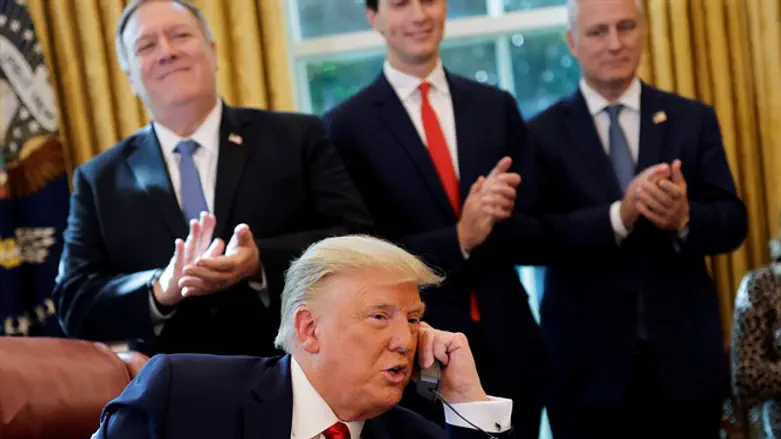
The normalization agreement between Sudan and Israel is at risk of unraveling as Sudan is demanding that Congress approve by year’s end legislation that would protect it from terror-related lawsuits, The New York Times reported Tuesday, citing five officials and other people familiar with the talks between US lawmakers and representatives of Sudan.
Without the congressionally approved immunity, foreign investors may be reluctant to do business with Sudan for fear they could end up financing potentially billions of dollars in compensation to terror victims.
Without foreign investment, Sudan’s transitional government has little hope of pulling its country out of widespread poverty and instability, noted The New York Times.
Secretary of State Mike Pompeo spoke on Monday with Sudan’s de facto leader, Lt. Gen. Abdel Fattah al-Burhan, who made clear that the East African nation would not move forward with warming ties with Israel before Congress passes the so-called legal peace legislation, according to the report.
A person familiar with the conversation said Pompeo assured General al-Burhan that the immunity plan would be approved in the next several weeks. Trump administration officials are already planning a signing ceremony with Sudanese officials at the White House in late December.
Spokespeople for the State Department declined to comment and the Israeli Embassy in Washington, which is closely following the negotiations, did not respond to a request for comment.
The announcement on the normalization deal between Israel and Sudan came shortly after President Donald Trump officially removed Sudan from the list of nations that sponsor and finance terrorism.
As part of the agreement for being removed from the State Department’s terrorism list, Sudan agreed to pay $335 million to settle legal claims of victims of the 1998 bombings against American embassies in Kenya and Tanzania which killed 224 people, including 12 US citizens, and injured thousands more.
According to The New York Times, some lawmakers have balked at the payment disparity for victims who were naturalized citizens after the attacks. Lawmakers are also divided over shielding Sudan from future court judgments that could compel Khartoum to compensate families of the victims of the Sept. 11, 2001, attacks.
Sudan’s 1993 designation as a state sponsor of terrorism dates to its toppled ruler Omar al-Bashir and has made it difficult for the transitional government in Khartoum to access urgently needed debt relief and foreign financing.
During Bashir’s time in power, Iranian warships regularly docked in Port Sudan, in what Khartoum described as “routine” visits.
Iran criticized Sudan for agreeing to normalize ties with Israel and accused it of paying a ransom in return for Washington removing it from a list of state sponsors of terrorism.